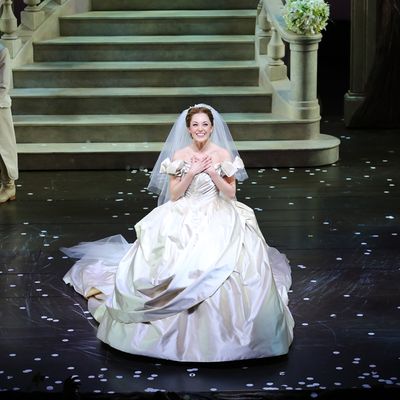
Modern couples: We fake it til we make it, am I right, fellow monogamites? And who’s more modern, more post-post-postfeminist, than Cinderella (Laura Osnes) and her prince (Santino Fontana)? The versions currently on Broadway sing songs from the 1957 made-for-TV musical by Richard Rodgers and Oscar Hammerstein II, but they’ve been reborn as well-meaning, directionless quarterlife-crisis victims turned unlikely class warriors. With a new irony- and Occupy-injected book by Douglas Carter Beane (The Little Dog Laughed), this wised-up, wit-spackled Cinderella seeks to erase all mental images of Julie Andrews and Lesley Ann Warren staring dewily at waxen princes. (Not that those mental images even exist in the target audience of currently preadolescent girls — still the world’s top consumers of $15 lobby-sold plastic tiaras, barely edging out middle-aged theater critics.)
There honestly isn’t much to salvage in Hammerstein’s original book, nor the modest rewrites from later broadcasts, but here’s what hasn’t changed: Neo-Ella is still the downtrodden, orphaned stepdaughter of an ambitious harridan (Harriet Harris, a tart treasure) who smothers the girl’s natural grace and beauty to better show off her own awkward spawn (gawky-sexy Marla Mindelle and daffy Ann Harada) to the medieval social scene.
But Ella’s been armored with all the accoutrements of pop postfeminism, including reserves of spunk, wit, will, choice one-liners, etc.: This Cind — whom the effortlessly appealing Osnes occupies with poise — is still very much an ingenue, but not the dull sort that just waits around for her dreams to come true. (That famous slipper-slip? I won’t spoil it for you, but let’s just say it’s not your grandmother’s wardrobe malfunction. There’s actual agency involved.) Also, like her latter-day cognate Elphaba a couple of blocks away, Cinderella is so totes not down with the status quo, eminent-domain-and-peasants-rights-wise. Osnes, with nothing more than a smile and her preternatural presence — unassuming and all-assuming, at once — bridges a seemingly unbridgeable gap with ease. She convinces us that the woman who sings “I’m as mild and as meek as a mouse / when I hear a command I obey” is the same woman who longs to talk wealth-distribution with the Chief Executive. Love blooms, but it’s inseparable from flowering progressivism, and Ella’s half-admitted drive to bag a royal is redeemed by a vague mist of politics. All of this, of course, is still facilitated by a fairy godmother named Marie (a great-as-ever Victoria Clark), who first appears in rags but quick-changes into something a little more celestial when the time is right. (The many near-invisible gown-transformations are the most impressive aspect of the physical production.) “You’d be surprised how many beautiful gowns have crazy women in them,” deadpans Marie. And we’re sold. Doesn’t matter at all that these are just deflections, that this Broadway show, like all Broadway shows, is far more concerned with the gowns than the rags. Perfect casting — right down to the chorus — smooth staging and fluid hoofing heals all tonal rifts and revisionist overreaches, before you even notice them. The score floods your brain with Rodgers’s stately, aching melodies, including the bewitching “Ten Minutes Ago” and the clucking, catchy “Stepsister’s Lament,” translated here into a go-for-broke chorus number centering on Harada. (If you only know Harada as stolid stage-manager Linda on Smash — and if you’re a faithful enough Smash alpha-viewer to fixate on such things — then you owe yourself this.)
And what of the prince? No mere trophy. Called Christopher in the original, he’s been shortened to “Topher” here, with all the inchoateness and affably shambling nerddom that nickname confers. Fontana’s best known for his turn as a suburban neurotic in last year’s Off Broadway revelation Sons of the Prophet, and casting this master of squiggle-smiling self-effacement is the linchpin of Beane’s and director Mark Brokaw’s vision. (It doesn’t hurt that his mellifluous singing voice blends seamlessly with Osnes’s lucid ingenuous soprano.) Overeducated and under-focused, Prince Topher is too dependent on his Rasputinish vizier, Sebastian (Peter Bartlett), who keeps him far away from the real workings of his regressive regime. (There’s some sort of Hanseatic recession on.) Sebastian’s idea of a welfare state is token charity: When Cinderella and Topher meet, and she gives him a drink of water, Sebastian urges a small handout: “You’re going to give her some of your things, so she doesn’t have a revolution and take all of your things.”’
All of this — the stenciled-on Marxism, the retrofitted feminism — could collapse at any moment, and there’s a church-basement flimsiness to the whole production that doesn’t inspire immediate confidence. But the show grows on you quickly. Beane’s book is good-humored and well-tempered, and it stops just short of attempting too much. Why bother with a Chomsky exegesis here? Cinderella may not be an infinitely interpretable text — Beane’s always on the razor’s edge of ridiculousness — but every age is entitled to its own stock fantasies. Rodgers & Hammerstein’s (and Beane’s and Brokaw’s) Cinderella is as solidly entertaining a commercial proposition as they come, featuring one of Broadway’s finest ensembles and what might be its couple of the year: just a couple of regular folks, the soul-searching blue-blood and the enchanted-orphan, trying to get along, and getting along rather well indeed.
Cinderella is playing at the Broadway Theatre.

